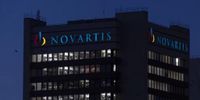On April 4, 2025, Novartis AG's stock price stood at 80.19 EUR, reflecting no change from the previous day. This stability contrasts with the broader market's fluctuations, particularly the Swiss Market Index (SMI), which faced significant losses.
Earlier today, Deutsche Bank AG reaffirmed its "Buy" rating for Novartis, setting a price target of 115 CHF for the stock. Analyst Emmanuel Papadakis noted the accelerated U.S. approval of Vanrafia, a treatment for primary IgA nephropathy, as a key factor in this positive outlook. Despite the stock's recent drop of 3.8 percent to 93.56 CHF, the potential upside remains substantial at 22.92 percent compared to the target price. Since the beginning of the year, Novartis shares have experienced a 9.3 percent increase, showcasing resilience amidst market volatility.
As the company prepares to release its Q1 2025 financial results on April 29, 2025, there is a palpable sense of optimism surrounding its performance. The past year has been transformative for Novartis, with CEO Vas Narasimhan highlighting that the company achieved one of its strongest financial results in its first year as a pure innovative medicines company. In 2024, Novartis reported net sales of approximately $50 billion (around 43 billion CHF), marking an 11 percent increase from the previous year.
This remarkable growth was fueled by new approvals and positive study results, underscoring Novartis's commitment to innovation and its strategic pivot following the sale of its generics division, Sandoz, and the separation from Roche holdings in 2023. The company has since focused on advanced therapies, increasing investments in gene and cell therapy, radioligand therapy, and xRNA technologies, with a geographical focus on markets such as the USA, China, Germany, and Japan.
On March 28, 2025, shareholders approved all proposals from the Board of Directors, including a dividend increase of 6.1 percent to 3.50 CHF, marking the 28th consecutive increase. This move reflects the company's strong performance and commitment to returning value to its shareholders.
However, Novartis is not immune to the broader market trends. Today, the SMI is down 5.5 percent, falling below 11,600 points, with losses exacerbated by concerns over rising oil prices, which have dipped below $65 per barrel for the first time since 2021. Major players like UBS and Julius Bär have extended their losses, while Adecco shares continue to decline.
Investors are seeking safe havens, leading to a notable increase in Swiss bonds, which are performing significantly better in this turbulent environment. The SMI's decline has been attributed to fears surrounding counter tariffs announced by China, further complicating the trading landscape.
In this context, Novartis's strategic focus on innovation and growth is crucial. The company has been making headlines with its advancements in treatments for conditions such as spinal muscular atrophy (SMA), which were highlighted in March 2025. These developments reinforce Novartis's position as a leader in the pharmaceutical sector.
As the market reacts to the ongoing economic uncertainties, Novartis's ability to navigate these challenges while maintaining its growth trajectory will be closely watched by analysts and investors alike. The forthcoming financial results are expected to provide further insights into the company's performance and strategic direction.
In summary, while Novartis faces external pressures from the market, its commitment to innovation and growth, coupled with solid financial results, positions it well for the future. The company continues to adapt and thrive, making it a focal point for investors looking for stability amidst market volatility.



